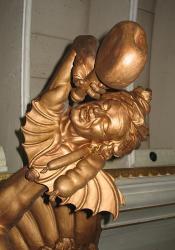The Term "Dipsomania" is Coined
Dipsomania was coined in 1819 by German physician Christoph Wilhelm Hufeland, and is a historic term that is no longer in use. Merriam Webster Dictionary defines dispomania as ‘an uncontrollable craving for alcoholic liquors’. While similar to alcoholism, this term was considered to be a medical condition, where a person craved alcohol due to a ‘disease in the brain’, and it became a popular term in medical communities. By describing someone as a dipsomaniac rather than a drunk, addict, etc, it would have casted them in a better light, as it was considered to be a medical condition that you could not help, but could potentially be fixed. One of the major differences between alcoholism and dipsomania was that dipsomania was considered to come upon someone very suddenly, where they an uncontrollable need for alcohol that last for a fairly short period of time-no longer than a few weeks. This made it especially seem more like an illness, where with alcoholism, people drink alcohol over long periods of time, and not as desperately.
We can see examples of dipsomania in a few characters in The Tenant of Wildfell Hall, including Arthur Huntington and some of his friends. In addition, it has been argued that the character of Arthur Huntington was based on Anne Brontes brother Branwell, who died of alcoholism and could have been considered a dipsomaniac.
“Dipsomania.” Merriam-Webster.com Dictionary, Merriam-Webster, https://www.merriam-webster.com/dictionary/dipsomania. Accessed 24 Nov. 2020.

